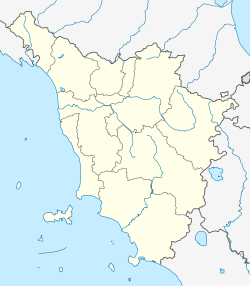This article needs additional citations for verification. (January 2013) |
Gavorrano | |
|---|---|
| Comune di Gavorrano | |
 | |
| Coordinates: 42°55′30″N 10°54′36″E / 42.92500°N 10.91000°E | |
| Country | Italy |
| Region | Tuscany |
| Province | Grosseto (GR) |
| Frazioni | Bagno di Gavorrano, Caldana, Castellaccia, Filare, Giuncarico, Grilli, Potassa, Ravi |
| Government | |
| • Mayor | Andrea Biondi |
| Area | |
| • Total | 163.98 km2 (63.31 sq mi) |
| Elevation | 273 m (896 ft) |
| Population (31 August 2017)[2] | |
| • Total | 8,596 |
| • Density | 52/km2 (140/sq mi) |
| Demonym | Gavorranesi |
| Time zone | UTC+1 (CET) |
| • Summer (DST) | UTC+2 (CEST) |
| Postal code | 58023 |
| Dialing code | 0566 |
| Patron saint | St. Iulianus |
| Saint day | August 28 |
| Website | Official website |
Gavorrano is a mountain-side comune (municipality) in the Province of Grosseto in the western Italian region of Tuscany, located about 100 km (62 mi) southwest of Florence and about 25 km (16 mi) northwest of Grosseto. Gavorrano borders the municipalities of Castiglione della Pescaia, Grosseto, Massa Marittima, Roccastrada and Scarlino.


The village is located on the northern slope of Poggio Ballone, east of Scarlino, in an area extremely rich in terms of mining, especially for large deposits of the iron ore pyrite which were intensively exploited until the early 1980s.
The town is known because of Pia de' Tolomei (whose fate is related in the "Purgatory" cantoes of the Divine Comedy by Dante Alighieri), and for being the birthplace of the writer Giuseppe Bandi, Italian patriot and journalist.
- ^ "Superficie di Comuni Province e Regioni italiane al 9 ottobre 2011". Italian National Institute of Statistics. Retrieved 16 March 2019.
- ^ All demographics and other statistics: Italian statistical institute Istat.



